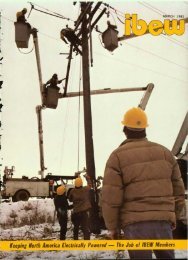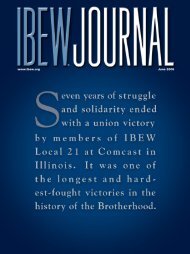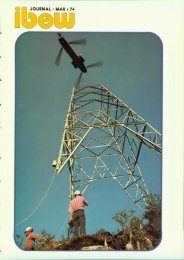T - International Brotherhood Of Electrical Workers
T - International Brotherhood Of Electrical Workers
T - International Brotherhood Of Electrical Workers
You also want an ePaper? Increase the reach of your titles
YUMPU automatically turns print PDFs into web optimized ePapers that Google loves.
NOVEMBER, 1942<br />
A. F, 4 LS.am / eta<br />
fr yin paeod Soc/cl Sea44~<br />
535<br />
ie coucil of the A nterieat Fede,,atmio<br />
of Leh.or o atines isues and poi<br />
icy i. staM¢ietl! ,iehic is later inedorsed<br />
by the etire i ,...le.. .tion at Toro tlo.<br />
UR program of society initiated by<br />
the Soeial Security Act, effective<br />
August t4, i25. must , be the foundation<br />
upon .we.. wage earners ea. plan<br />
their future Social security, as the Federation<br />
views it, is a basic social justice<br />
measure by which workers who have<br />
successfully demonstrated their ability to<br />
be sell-supporting are protected against<br />
bemninng dependent reei pients of relief<br />
because of emergencies outside of their<br />
conItol. These emergencies fall under<br />
three catgoiles: ( I) old age, when physical<br />
work ability declines; (2) disability,<br />
which is both permanent and akin to<br />
prelmature old age ald temporary, due<br />
to illness, which cause unemployment;<br />
and (3) unemploynlent due to loss of<br />
jobs. The Federalion is cnoec rned rot<br />
only that benefits for these emergencies<br />
shall be available, but that they shall be<br />
adequate t inalidi the seff dependency<br />
of wlorkers aid that they shall be well<br />
adt [1intste ied.<br />
DOES TIlE SYSTEM WORK?<br />
NNowv that our social security system is<br />
KING STREET, TORONTO<br />
Notable<br />
statement becomes official<br />
policy at Toronto 1942 convention<br />
in its seventh year, it is our obligation to<br />
evaluate and determine whether the sys<br />
tern accomplishes the purposes for whieh<br />
it was designed, and, if not, to suggest<br />
am~endmients.<br />
As the duration of employment for<br />
wage earners is determined by the needs<br />
of production and business chance, work<br />
ers though performing inldis pen sable service<br />
for the company and for society, have<br />
no guarantee of permanent eplohyment<br />
or in.ollie. In order that this instability,<br />
wvhich is in the interests of the copany<br />
and the public, shall not exist solely at<br />
the expense of wage earners, p'ovisions<br />
should be iade to tide workers iver the<br />
In ergenie s that intelfete wilb income<br />
earning. Under I tr competitive system<br />
it would be difficult indeed for any coIn<br />
parny or any one industry to guarantee<br />
the economic security of its work stafr<br />
throughout their lives. But by poolirng the<br />
rishs, and by each company making contrilutiOns<br />
hlo a poolhd lund, companies<br />
can ul led ively provide for the human<br />
side of industry as they do for the materlI<br />
through depleciation or amortization<br />
funds.<br />
EMERGENCY STRAINS SEVERE<br />
In nnrmal timies social security can<br />
meet the need, but in times of great<br />
emergencies such as we are passing<br />
through, there is grave apprehension lest<br />
our system may not be adequate for the<br />
load it will have to ca]ry. At present employment<br />
demands are so large and so<br />
urgent that the number of those on the<br />
natironal wok force in both military and<br />
civilian occupations is between 58 and 59<br />
millions. As our manpowe r hasbeentaken<br />
by the military forces older men and<br />
women have been called to take their<br />
places and toI fill new jobs. Each year<br />
that the war continues, the military will<br />
require Tore men, and more of our normal<br />
reserves ,ill have to carry on civilian<br />
work. This means that a larger percentage<br />
of ou. population will be members of<br />
the work force and direetly.oncerned with<br />
social security provisions, paying contributions<br />
into it and looking to it for benefits<br />
to tide over e..e gence s. T]he greater<br />
the nu e),r of people on war wrk, II he<br />
grea tor will he the ' ost-war readjust<br />
eant aid uneiplhyinnt. It is el Iitne{st<br />
nportance t hat during this period of<br />
peak eplynient we mlan ample provisitn<br />
to previd{ l) for Infiis the transition<br />
to a peace time econony. Nut only is this<br />
course wise plannnlg fo wage r earners I.t<br />
it is quatlly a prudent and constructive<br />
policy for business and for the, go.eranieet.<br />
Fur busi.s.. n expatnsion and<br />
strengthening of the social security s; S-<br />
ternW iiow ears the accumluation of reserves<br />
for meeting fature el igaLions<br />
which wold otherwise require iose-war<br />
taxation, and wi i assure constinie r buy -<br />
mig power duling emergencies. For gov<br />
erm .nt. it mesans larger reserves . 'wh<br />
wheun invested in fedsral oands become..<br />
available for current use, and by increasing<br />
current savings inflationary f.rces<br />
are proportionately decreased. For the<br />
wcrke $. it means the provision of insrance<br />
as a right while there is time to<br />
accumulate reserves to assure payment<br />
qof that insurance.<br />
PREPARE FOR FUTURE<br />
Obviously this is the cruclal time for<br />
revising our social s curity system to enable<br />
it to meet needs of iorkers in a<br />
period when emergencies will be cate<br />
elysnole in sharpness and i. Scope. Now is<br />
the time to set up an adequate and coordinated<br />
system capable of meeting the<br />
preoblems of post-war transition and<br />
peace-time production.

















